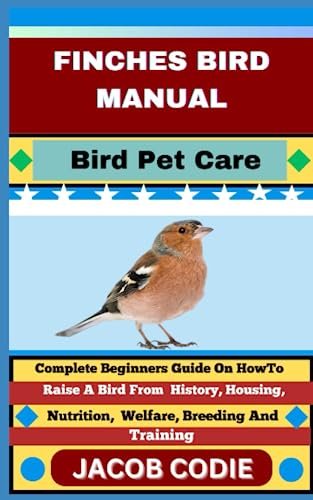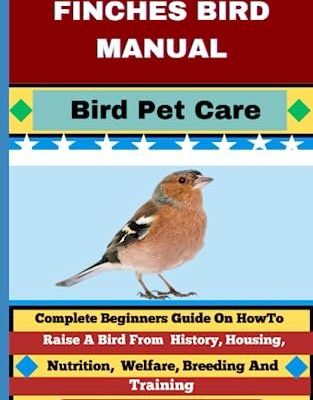
Getting started with finches can feel daunting—especially if you’re new to pet ownership. Think of it like learning to dance. At first, the steps may seem complicated, but with practice and patience, you’ll soon find your rhythm. In this guide, we’ll walk through everything you need to know about caring for your finches, from their diet and habitat to social behaviors and health checks. Let’s dive in!
Choosing the Right Finch for You
Before you welcome a feathered friend into your home, you’ll want to pick the right type of finch. There are many species, but some of the most popular include the zebra finch, society finch, and golden finch. Here’s a quick overview of each:
- Zebra Finch: Known for their striking orange and black markings, zebra finches are social and active. They thrive in pairs or small flocks.
- Society Finch: Often more calm and friendly, society finches adapt well to various living conditions. They’re a great choice for first-time bird owners.
- Golden Finch: With their bright yellow plumage, golden finches are visually stunning. They’re energetic and love to sing, making them delightful companions.
You might be wondering which one to choose. Think about your lifestyle, space availability, and how much time you can devote to interacting with your birds. Remember, finches are social creatures. Ideally, they should be kept in pairs or small groups to stay happy and healthy.
Setting Up the Perfect Habitat
Creating a comfortable home for your finches is crucial. Imagine their cage as their little kingdom. The size of the cage matters. A spacious aviary is ideal, but if space is limited, aim for a cage that’s at least 30 inches long and 18 inches deep.
In the cage, ensure you have:
- Perches: Use different sizes and materials to keep their feet healthy.
- Food and Water Dishes: Place these in easy-to-reach spots. Clean them daily to ensure fresh supplies.
- Toys: Finches are playful! Add swings and foraging toys to keep them entertained.
Here’s the thing: finches enjoy flying. So, the bigger and more stimulating their home, the happier they’ll be. If you have the option, consider letting them out for supervised flying time in a safe space. It’s like giving them a taste of freedom!
Feeding Your Finches Right
Feeding your finches is one of the easier parts of being a bird owner, but it’s still important to get it right. A good finch seed mix should be the base of their diet. Look for quality brands that include:
- Millet
- Canary seed
- Oats
But wait, there’s more! Fresh fruits and vegetables are a great addition to their diet. Consider including:
- Chopped carrots
- Leafy greens (like spinach)
- Small pieces of apple or banana
Just remember to wash everything thoroughly and remove any uneaten fresh foods after a few hours to prevent spoilage. Honestly, variety keeps your birds excited about their meals!
Social Behavior and Bonding
Finches are social birds that enjoy company. If you’re keeping a pair, they’ll naturally bond with each other. But how about you? Spending time with your finches is essential for building trust. Here’s how you can do that:
1. Talk to them: Your voice will reassure them that they’re safe. Even if you feel silly, chat casually while you’re near their cage.
2. Hand feeding: Once they’re comfortable, try offering treats from your hand. It’s like sharing snacks with friends!
3. Supervised time out: As mentioned before, let them fly in a safe space. Using a small room where they can explore gives them exercise and lets you bond.
You might be surprised how quickly they learn to recognize you. Just like with any pet, a little patience goes a long way.
Health Care and Common Issues
Keeping your finches healthy is a top priority. Regular monitoring is key. Here are a few signs your finches might need a vet visit:
- Changes in eating habits
- Fluffed-up feathers
- Inactivity or lethargy
Finches can also be susceptible to some common health issues. Respiratory infections can occur, especially in cramped or dirty conditions. Ensure their living area is clean and well-ventilated.
Regular check-ups with an avian vet are a wise investment. It’s sort of like getting a yearly check at the doctor. Early detection can make a big difference!
Finding the Right Supplies
When you’re setting up for your finches, you’ll need to invest in a few essentials. Here’s a quick shopping list to get you started:
- Cage
- Perches
- Food and water dishes
- Seeds and fresh foods
- Bird toys
- Bathing dish
You don’t have to break the bank, either. Many stores offer budget options. Just ensure the quality is high, as your finches will be interacting with everything you choose.
Understanding Finches’ Lifespan and Longevity
You might be surprised to learn that finches can live for quite a while! With proper care, your feathered companions can thrive for 5 to 10 years and sometimes even longer. Their lifespan largely depends on factors like diet, living conditions, and healthcare.
Giving them a good start—like quality seeds, a clean environment, and daily attention—will help them live longer and happier lives. It’s like investing in a better future for someone you care about.
In the end, caring for pet finches is all about creating a nurturing environment where they can feel safe and loved. It takes effort, but the joy they’ll bring to your home is immensely rewarding. Just think of them as tiny entertainers who fill your days with delightful melodies and cheerful antics. Welcome to the wonderful world of finches!

